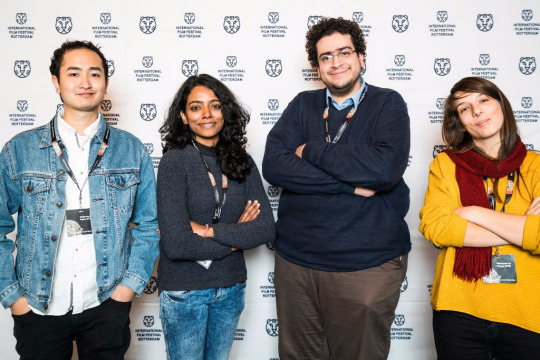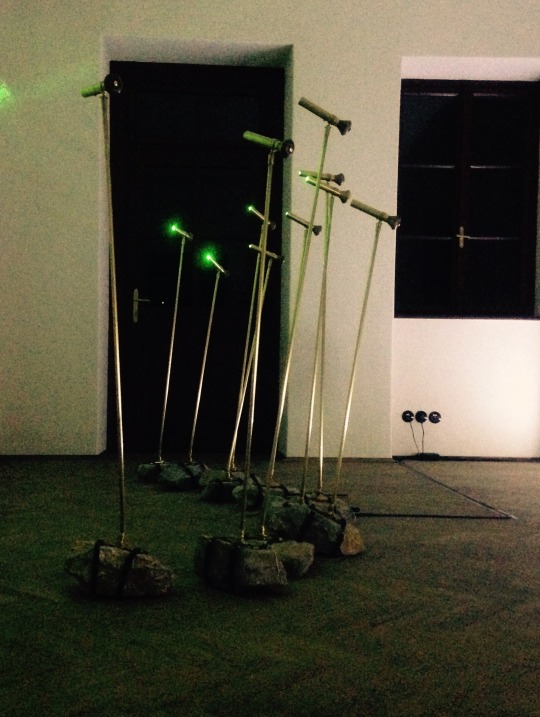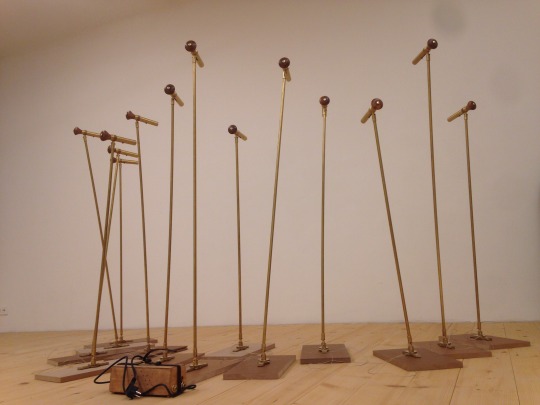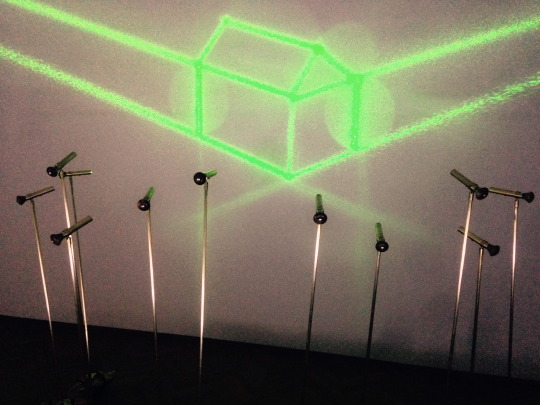#Petra Meterc
Text
Planet youth

From left to right: Ngọc Nick M, Aswathy Gopalakrishnan, Adham Youssef, Petra Meterc; photo: courtesy of IFF Rotterdam
As every year, International Film Festival Rotterdam invites a bunch of young talents from all over the world to represent the new generation of journalists and critics, and Yoana Pavlova is there to interview them. Only this time Festivalists was officially part of the education process, and be it because of the zeitgeist, or because of the 2017 trainee selection, the conversation revolved around the existing politics of cinema and festivals' Realpolitik, as well as around the audiovisual future of criticism.
In a festival like Rotterdam that grew and grew until it became Planet IFFR, projects that focus on young film critics might look like small asteroids. This makes the contact even more valuable and heartening. Take each one of these trainees, though, and you would discover a whole universe, an accomplished professional with different background, interests, taste.
Ngọc Nick M wrote on the controversial Vietnamese horror KFC. Aswathy Gopalakrishnan interviewed filmmakers like Rahmatou Keïta and Julian Rosefeldt, weighting also on the Hivos Tiger Award winner SEXY DURGA. Adham Youssef talked to the creative duo behind CAIRO JAZZMAN. Petra Meterc reported on the Jan Němec's retrospective launch and met the hope of German cinema Julian Radlmaier.
Still and all, the four have one thing in common – their capacity and drive to capitalize on the IFFR experience.
Yoana Pavlova: My first question is related to your decision to take part in the IFFR Trainee Project for Young Film Critics – were you familiar with the festival before applying, or it was the information about the project that caught your attention in the first place?
Ngọc Nick M: Before Rotterdam, I had participated in Tokyo International Film Festival in Japan three times and some local festivals in my country (Vietnam) as a journalist. This is my first experience at an European film festival. To me, IFFR is one of the most important events in the film industry. Numerous Vietnamese filmmakers wish to submit their features or shorts to Rotterdam. At the end of October last year, I was made aware of the IFFR Trainee Project for Young Film Critics through a new friend who works for IFFR as a programmer. I immediately applied, because it would have been a great opportunity to explore IFFR and improve my writing skills. Furthermore, I will be 30 in October this year, so IFFR Trainee Project for Young Critics 2017 was my last chance for this program.
Aswathy Gopalakrishnan: Yes, I had heard of IFFR before, since the Hivos Tiger Competition section is quite well-known in the filmmaking / film journalism circles in India. A few years ago, THE IMAGE THREADS / CHITRA SUTRAM (2010), a film by the young Indian director Vipin Vijay, had been screened at the festival. The name of the fest is what caught my interest initially.
Adham Youssef: I was familiar with the project IFFR had for young film critics, but I did not know the actual details. I knew from the start that IFFR was a festival with a rather informal mechanism which welcomes young people and talents, especially in the filmmaking area, and gives them the opportunity to experience and learn. This really encouraged me to apply and to be part of this year’s selection.
Petra Meterc: I heard a lot of interesting things about the Rotterdam festival, and this autumn I realized they also organize the IFFR Trainee Project for Young Critics, so it was the combination of wanted to experience both.
YP: To what degree this festival edition, including the Trainee Project, met your expectations?
NNM: I am greatly satisfied with my experience at this year’s IFFR. I watched more than 10 films that would be difficult to find in cineplexes in Vietnam, such as NOCTURAMA (2016), YOURSELF AND YOURS / DANGSINJASINGWA DANGSINUI GEOT (2016), AMERICAN HONEY (2016), and MOONLIGHT (2016). Moreover, director Barry Jenkins’ masterclass and two expert meetings with experienced film critics Jay Weissberg and Clarence Tsui have inspired me tremendously. As an IFFR Trainee, with my three new friends from Slovenia, India, and Egypt I acted as a member of the FIPRESCI jury for the Bright Future section. It was my first time as a jury member, and it was quite a terrific moment debating and picking the winner.
AG: Regarding the trainee project, I had not much idea how the programme would be, when I arrived in Rotterdam. This was my first such experience ever. I was just glad to be a part of it.
This project helped me mitigate the doubts I had as a film critic, at least to a large extent. The discussions and mentor sessions with people like Jay Weissberg were really insightful. The festival had a warm, amiable ambience that would make any cinephile feel at home.
AY: For this edition, I was very satisfied with the film selection, which was very rich and diverse. The programming as well as the ability to capture several themes and merge them into the large scope of the festival’s objective were really fascinating. The same goes for the organization of the festival and the dedication of the staff. Personally, from an artistic and logistical points of view, IFFR is one of the international festivals that really stands out, and which will continue to inspire more people in the field of film.
This year’s Trainee Project had more of a free-for-all agenda, when approaching the interns and their work. The coordinators, fortunately, trusted the trainees to set their own schedules and plan their own interviews. I really liked the approach, compared with the experiences of former trainees whom I met, who mentioned that there was a rather pyramid-like structure when it came to assignments and mentoring, which was accompanied by deadline pressure and stress, something I am glad I did no experience on my first festival abroad. The coordinators also highlighted for us certain events or figures that needed attention, or which they needed to have the spotlight on. I do not mind getting assignments. I think it is part of the experience, to be challenged to go outside of your comfort zone, maybe with topics or artists you are not very aware of. The mentorship sessions, despite several logistical difficulties, were successful, in my opinion. All the trainees this year had previous publishing experiences, but the mentoring sessions were effective in showing how editors usually look and evaluate articles. Also receiving live feedback in a group session is always, for me at least, a good experience, to get challenged and remain critical of your work and hoping for more improvement.
I would have hoped, however, for more coordinated sessions with experts, like for example editors, video essayists, or broadcast show hosts, mainly individuals who would share experiences that do not necessarily have to do with film journalism. Another issue that I would have liked was to coordinate more with the people from the daily printed newsletter. I think to have a review or a report published would have been for the trainees an achievement in the whole experience of the festival.
PM: The festival edition met my expectations regarding the programme and the general atmosphere there, however I did not know what to expect from the Trainee Project. I think the project gave me a lot of valuable experience, especially by meeting experts from the same field of work and, of course, by having the chance to meet other young critics from all over the world and the possibility to discuss film, work, and so much more with them.
YP: What would you change from your festival stay, if you could go back in time?
NNM: I wish we could have met you from the very first day. At the beginning, I was a bit confused about what to do during my stay, so I just went to selected screenings. After our meetings with you, I had a clearer direction of what to achieve throughout the festival.
AG: Maybe I would try to pick films to watch more carefully. This time, I chose films randomly, and later I realized that I missed out a few must-watch films.
But in general, I am happy with what I experienced at the festival. I wish I could go back in time, not to change anything, but just be there and watch many more films.
AY: I would have changed two things. Having a more organized schedule is the first. Being a rookie at a mega festival like Rotterdam that includes dozens of exciting daily screenings and events left me at times confused and being unable to organize. I managed to watch as many films as I could, whether in theatrеs or in the video library, but nevertheless I think I needed more discipline when organizing my festival plan.
Another thing I would have intensified was expanding my networking skills more and more. I think I did enough this year, again for a first-timer. In the future, I guess I need to further develop this skill, which I now know is crucial in this field.
PM: I would probably wish for some additional meetings with various experts who would advise us on our writing, on work opportunities, and work conditions. I would also wish to collaborate a bit more with the IFFR blog team.
YP: Could you please tell me a little bit more about this year's Trainee Project, the way you experienced it, what was the most useful thing you learned?
NNM: IFFR Trainee Project has given me a valuable learning experience on the independent and experimental cinema. As a journalist, I obtained an overview of how the festival is run, from the screenings to the parties and the audience contribution, how to network, how to use the catalogue, and how to distribute my time during the festival. I personally love the atmosphere of IFFR the most. Each screening was full with excited audience, even for those aspiring directors from different corners of the world. I could feel a strong sense of diversity here. As a FIPRESCI jury member, I learned how to judge the competition and improve my debating skills. As a young film critic, I tried to watch and review films I had seen. And you helped enthusiastically with editing my reviews.
AG: I learned that it is important – very, very important – to be honest. It is important to not get carried away by the popular opinions, and express our own views freely and clearly. That kind of courage and honesty will definitely make the review read many times better.
AY: I think I answered the main part of this question above. However, concerning the part of what I learned, I would like to say a couple of things:
The first is that the very vague and problematic term “independent cinema” was deconstructed for me in my experience at this festival. Ultimate freedom to make a film is a type of freedom that artists are not yet granted. As an individual coming from the so called “developing” part of this world, I concluded that filmmakers, even at the very prestigious festivals, are still restricted. Of course, not by censorship or by banning, like what happens in many cases, but by being tempted, for funding purposes, to present narratives that appeal to the other part of the world, the “developed” countries. Narratives that get easily digested in Europe and the US.
But I must say that my argument is still not fully ripe. I am very encouraged to investigate this topic more and more, especially given that it is very critical to individuals and institutions who very much value the idea of “independent art,” and take it for granted, without reading between the lines of its politics and economics. I think I should also start to speak to more filmmakers to understand the aspects of funding, because it is very important.
Second, out of honesty, I have to say that I have outgrown ideas that writing about film is an activity that makes me happy and pleased. My experience in the festival opened my horizons into the “industry” side of the film criticism. Also, it opened my eyes to the politics and agenda that can surround this activity.
Finally, regardless of these last two critical points, I can safely say that despite all of the horrors that we see in this world, cinema remains a tool for human beings to express, question, and challenge, and propagate ideas. This sounds like a cliche, but it has to be said. The amount of talent, passion, and effort I saw in the films I watched, made me further believe in the medium of film.
PM: The Trainee Project enabled us to fully experience the festival; we did some writing for the IFFR blog as well as for our home affiliations, we had a few expert meetings, and joined the FIPRESCI jury with their decision-making on the FIPRESCI award. Probably the most useful thing that I had the chance to experience is how to write a review immediately after attending a film screening. I believe it is a special skill to be prepared to write right after watching a film and to do that as fast as possible.
YP: What was your personal highlight of the festival (film, special event, person)?
NNM: My personal highlight of the festival was the chance to meet Adham, Aswathy, and Petra. It was our first time at IFFR, and we had a great time. I remember the days we woke up at 8 am to catch the tram #7 to De Doelen. After breakfast, we explored IFFR in our own way. Some spent their time in the video library, some joined meetings, and others went for interviews. I would like to say thanks to the IFFR Trainee Project for connecting us. Everything was so fresh, and I cherished every second at IFFR. I will always remember the moment we unanimously selected German film SELF-CRITICISM OF A BOURGEOIS DOG / SELBSTKRITIK EINES BÜRGERLICHEN HUNDES (2017) as our favorite from the Bright Future section, and the debate with the FIPRESCI Award jury. Additionally, the MOONLIGHT screening and Barry Jenkins’ masterclass were also the high points of IFFR.
AG: The meeting with the FIPRESCI jury was a great experience. So were the sessions with Jay Weissberg and Clarence Tsui.
Even more interesting were the discussions and negotiations in which we, the four young trainees, had to choose the one film to vote for. We have different tastes in films, so it was not easy to arrive at a conclusion. We would watch the films, make (long) notes on why we liked / disliked a certain aspect of the film, and put forth our view when the team would meet for a coffee afterwards. I had never had a more meticulous and interesting movie-watching experience.
AY: I cannot say I have a single highlight. However, an event that I really appreciated was getting to see Hungarian film director Béla Tarr, in the flesh. Although I did not get the opportunity to attend his masterclass, I managed to meet him in a very informal and quick manner afterwards, unfortunately without getting to ask questions or even probably introduce myself. Nevertheless, it was mind-blowing to see a living legend, whose work defined different schools of filmmaking.
Other meetings that I really enjoyed, where I got to ask questions and talk about my experience, were those with film critics like Jay Weissberg and Clarence Tsui. I think those meetings were beneficial, as both critics really addressed different aspects of the film criticism business. I am glad they did not limit to discussion of the platonic image of film criticism, being a romantic job, but stressed on many challenges, such as meeting deadlines, being limited to a certain editorial policy, or even pros and cons of attending festivals, etc. Also the fact that both are not just big names in the industry, but also academics who wrote longer film analysis, was really interested to me as my approach to film criticism usually tackles sociopolitical aspects in the film and not just the aesthetics.
PM: Although I liked the Trainee Project and of course the films that we got to see at the festival, I must say that the personal highlight was the three other young critics that were in the project with me. I learned a lot from them and really enjoyed being in their company. One of the most interesting and valuable part of the programme for me was probably the Black Rebels panel – it was amazing !
YP: Now with this Trainee Project in your CV, how do you see your future in the filed of film journalism and criticism? Is there a certain aspect of the profession you feel like you need to master?
NNM: I will continue to develop my journalist and critic's career by writing more articles and reviews, doing more interviews. However, I will try to write more in English in order to reach more readers. Also, I want to promote the IFFR Trainee Project to young Vietnamese who want to work in the field of film journalism and criticism, so they could apply in the coming years. With my new connections from IFFR, I hope to create a network for Vietnamese filmmakers to help introduce their works to international film festivals like Rotterdam.
AG: Now there are vlogs and video essays which are becoming more popular. There are interesting ways to use social media in film criticism. While it is important to not lose sight of the true essence of film criticism, it is also important to update oneself constantly and make our voice be heard.
Nowadays, anyone who has some time to spare and a little flair for writing thinks he can be a film critic. There is a surge in the number of such amateurs. It is important to learn about films more – look at it as an academic discipline. That will make our writings stand out of the pile.
AY: Personally, whenever I attend a film workshop or hangout with a group of film critics, or directors, or individuals from the industry in general, I keep a notebook to write the amount of names of directors, films, movements I do not know of. My experience in Rotterdam left me with dozens of names I need to explore and learn about.
The experience also left me eager to further practice different kinds of criticism, and not to limit myself to a single genre, all under the title of a film critic. However, the type that I would like to further develop my skills in is longer essays that focus more on using films and movements as a tool to deconstruct and understand society and politics.
PM: I think my next step should be trying to publish my writing in foreign or international outlets. I would also like to attend and report from more international festivals and keep on learning while doing that.
#IFF Rotterdam#IFFR2017#Trainee Project for Young Film Critics#FIPRESCI#Hivos Tiger Award#Bright Future#Black Rebels#Planet IFFR#Jay Weissberg#Clarence Tsui#Barry Jenkins#Béla Tarr#Jan Němec#Self-criticism of a Bourgeois Dog#Julian Radlmaier#festival life#Ngọc Nick M#Aswathy Gopalakrishnan#Adham Youssef#Petra Meterc#interview#Yoana Pavlova
0 notes
Photo

Memories of The Home
"Home is where we 'grow roots', it is a place of intimate and collective memory, as well as a reference point of an individual and the community" *

In 2018 I was invited by International Centre for Graphic Arts - Ljubljana, Slovenia, as the first international residency artist of Švicarija Centre, to do a research on the identity of the building. Throughout the years, Švicarija acquired different identities, while its use changed. I focused on researching the hidden aspects of its history, in particular the collective coexistence of its users, and as a result I produced a light installation to reveal those hidden aspects.
Installation Text:
Though set up as one of Ljubljana’s high-end places, it didn’t take long for the Swiss House to took on a life on its own. Artists, bohemians, vagabonds, Russian immigrants, “les miserable’s”, social tenants found themselves together in the Swiss House, in the little village, hidden in the woods, overlooking the city. In this remarkable period of the Swiss House, often overlooked as dirty or poor, all the various residents with their own backgrounds and stories were making friendships, solving conflicts, taking care of the House and its surroundings. Living on the edge of the forest, in harsh conditions, the people of the Swiss House were relying on each other. They have made the house their home and the House made them a community.

research and interviews
Arne Zupančič
Special thanks to Ivanka Jerman, Vojko Anzeljc, Bejza Bejtić Topalović, Ahmo and Denis Hašić, Petra Meterc, Alija Đogić and Nina Savič.
*Identities of a house: Švicarija and its inhabitants through time, Andrej Boštjančič.

Crafted In Istanbul - Produced with the help of :
Turret Lathe Master - Nedim Usta
Lathe (metal) Master - Cemal Usta
Lathe (wood) Master - Muammer Usta
Brass Pieces - Taylan
Exhibitions:
'Svicarija: Community, Art and Nature' - February ’18
@ Švicarija Creative Center, Ljubljana, Slovenia“ | MGLC_ Residence Artist
0 notes